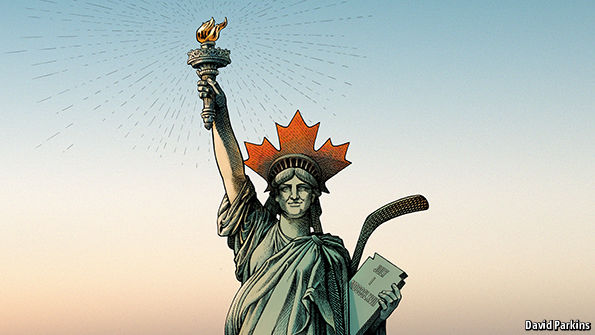Over the years, I’ve heard people of a certain political persuasion argue that the United States should be more like their northern neighbor Canada. And over the years, I’ve enthusiastically agreed, but mostly for different reasons. A recent article in The Economist captures a few of those reasons:
Donald Trump, the grievance-mongering Republican nominee, would build a wall on Mexico’s border and rip up trade agreements. Hillary Clinton, the probable winner on November 8th, would be much better on immigration, but she has renounced her former support for ambitious trade deals. Britain, worried about immigrants and globalisation, has voted to march out of the European Union. Angela Merkel flung open Germany’s doors to refugees, then suffered a series of political setbacks. Marine Le Pen, a right-wing populist, is the favourite to win the first round of France’s presidential election next year.
In this depressing company of wall-builders, door-slammers and drawbridge-raisers, Canada stands out as a heartening exception. It happily admits more than 300,000 immigrants a year, nearly 1% of its population—a higher proportion than any other big, rich country—and has done so for two decades. Its charismatic prime minister, Justin Trudeau, who has been in office a year, has welcomed some 33,000 Syrian refugees, far more than America has. Bucking the protectionist mood, Canada remains an eager free-trader. It was dismayed by the EU’s struggle to overcome a veto by Walloons on signing a “comprehensive” trade agreement that took seven years to negotiate (see Charlemagne). Under Mr Trudeau, Canada is trying to make amends for its shameful treatment of indigenous peoples, and is likely to become the first Western country to legalise recreational cannabis on a national level.

The article acknowledges that Canada’s geographic location, history, and the like are important factors for its political decisions above, but it nonetheless makes an effort to find against the populist rhetoric within its own borders:
Canada not only welcomes newcomers but works hard to integrate them. Its charter of rights and freedoms proclaims the country’s “multicultural heritage”. Not every country will fuse diversity and national identity in the same way that Canada does. Indeed, French-speaking Quebec has its own way of interpreting multiculturalism, which gives priority to the province’s distinct culture. But other countries can learn from the spirit of experimentation that Canada brings to helping immigrants find employment and housing. Its system of private sponsorship, in which groups of citizens take responsibility for supporting refugees during their first year, not only helps them adapt but encourages society at large to make them welcome. The UN High Commissioner for Refugees has called on other countries to copy it.
Canada has been managing its public finances conservatively for the past 20 years or so. Now in charge of a sluggish economy, Mr Trudeau can afford to give growth a modest lift by spending extra money on infrastructure. His government has given a tax cut to the middle class and raised rates for the highest earners to help pay for it. These economic policies deserve to “go viral”, the head of the IMF has said. Canada has a further economic lesson to impart in how it protects people hurt by globalisation. Compared with America, its publicly financed health system lessens the terror of losing a job; it also provides more financial support and training to people who do. And its policy of “equalisation” gives provincial and local governments the means to maintain public services at a uniform level across the country.[ref]Large welfare systems have pros and cons when it comes to economic growth, innovation, and entrepreneurship.[/ref]
Perhaps most important, this mixture of policies—liberal on trade and immigration, activist in shoring up growth and protecting globalisation’s losers—is a reminder that the centrist formula still works, if politicians are willing to champion it.
Of course, it’s important to point out that Canada “remains a poorer, less productive and less innovative economy than America’s.”[ref]However, scares over a “stagnating middle-class” in Canada are just as overblown as they are here in America.[/ref] Trade among provinces is still problematic and the “peace, order and good government” that is “enshrined in its constitution” may be “inadequate without an infusion of American individualism.” But when Canada outpaces the U.S. in economic freedom,[ref]Pg. 8.[/ref] it may be worth looking at the things they get right.
Seriously this sounds like a government press release. I live in Canada and the reality is a far cry from that described in this article.
My advice: don’t believe everything you read.